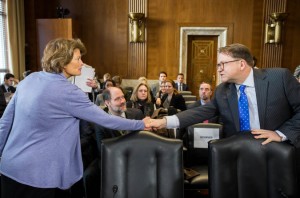Rare Bipartisan Bill In Senate Seeks To Reshape U.S. Energy
< < Go Back
The Senate on Wednesday started debating its first comprehensive energy legislation since the George W. Bush administration, a bipartisan measure meant to update the nation’s power grid and oil and gas transportation systems to address major changes in the ways that power is now produced in the United States.
Since passage of the last major energy law, in 2007, the United States has gone from fears of oil and gas shortages to becoming the world’s leading producer of both fuels. The use of wind and solar power is rapidly accelerating as those sources become cheaper than fossil fuels in some parts of the country. And President Obama’s clean air regulations are reshaping the nation’s power systems, as electric utilities shutter coal-fired power plants and replace them with alternative sources.
But the nation’s energy infrastructure has not kept pace with those changes.
The energy measure is co-sponsored by the Republican chairwoman of the Energy Committee, Senator Lisa Murkowski of Alaska, and the ranking Democrat on the committee, Senator Maria Cantwell of Washington.
It is a rarity in today’s largely gridlocked Congress: compromise legislation that has been carefully written over months of hearings, passed through the energy panel on a bipartisan vote of 18 to 4.
It has the support of the Senate majority leader, Mitch McConnell, Republican of Kentucky, and the minority leader, Harry Reid, Democrat of Nevada, who are usually seen strategizing to block the other’s agenda.
In order to achieve a bipartisan consensus, Ms. Murkowski and Ms. Cantwell had to significantly scale down the scope of the bill. It is chiefly focused on modernizing energy infrastructure and improving energy efficiency. It does not include language to drastically increase fossil fuel production, as most Republicans would like, nor does it boldly address climate change, as most Democrats want.
“It’s the product of the committee process,” Ms. Murkowski said in a telephone interview. “It is not everything to anybody, and I recognize that.”
More From The New York Times:




